As a follow-up to my earlier look-back post, My Bookish Highlights of 2024 Part 1, here is Part 2! Maybe I can get all the photos to show up correctly this time.
Bookish Highlights
July 2024
Sisters in Crime Author Panel
Attended a Sisters in Crime “Mystery Making” author event with Massachusetts mystery authors Joanna Schaffhausen, Nicole Asselin, Liz Mugavero, and Dale Phillips. Together with the audience, the panel of authors came up with the outline of a plausible murder mystery on the spot, along the lines of Mad Libs, using plot, characters, setting, and murder weapon based on audience input and an element of chance.
It’s on the Brockton Public Library’s YouTube, if you want to check it out:
August 2024
Galway, Ireland
This wasn’t a bookish trip, but we had a whole week in Ireland (Dublin and then Galway) last August, so we were bound to come across a bookstore at some point along the way!









September 2024
Author Talk — J. Courtney Sullivan
I wrote about hearing J. Courtney Sullivan speak at a library near me in this Sunday Salon post last September.

Another September bookish highlight was that as part of my library’s 150th anniversary celebration, we hosted a Sisters in Crime panel of our own, with Massachusetts mystery authors Leslie Meier, Joanna Schaffhausen, and Marcy McCreary.

These authors were so personable and entertaining that evening. I haven’t gotten to Marcy McCreary’s or Joanna Schaffhausen’s books yet, but I did manage to listen to Leslie Meier’s latest Lucy Stone mystery on audio in October.
October 2024
Having a character named after me?
Listening to Patchwork Quilt Murder in October led to another possible bookish highlight — hearing my full name attached to one of the characters, albeit a very minor character! (The Laurie C in the story isn’t a librarian, but I think possibly a gym teacher. I can’t remember for sure now, and I’m actually not 100% sure that she named the character after me, but she IS a resident of the town where our library is and is a library regular. I keep meaning to ask her!)
Being part of our granddaughter’s first visit to the library
I missed the Boston Book Festival in October 2024 because we were away.
But we got to go along with our granddaughter on her first visit to a branch of the public library near where they live! We went for a toddlers’ dance party, and stayed to check out the children’s section, where she shyly played alongside the other kids, listened to a few stories, and even tried reading one on her own.

She’s turning two this month!
November 2024
New Independent Bookstore Opened Up
A new independent bookstore opened up in my home city! The Dr. Ellie Paris Bookstore is a tiny but vibrant bookstore, cafe, and event space downtown, right around the corner from the public library where I used to work.







December 2024
During our holiday tourist weekend with our daughter, we took a tour of the New York Public Library’s Stephen Schwarzman Building (the one with the library lions). I posted about the library tour previously:
The next day, we spent a rainy hour inside The Strand bookstore when we needed an alternative to West Greenwich Village outdoor sightseeing.




Currently Reading
Shrines of Gaiety by Kate Atkinson

My First Book of the Year is finally getting read!
The Winter of Our Discontent by John Steinbeck
This title felt appropriate for right now, but also I’m reading it for the Massachusetts Center for the Book challenge (a book published in the year you were born).
My Unveiling: A Memoir by Tracy Baker
My Unveiling is a memoir by a friend who was part of our Local Author Book Fair in December. Just started it, but it’s very moving.
Recently Read
The God of the Woods by Liz Moore

This was a page-turner once it got going!
Currently Listening To
People Person by Candice Carty-Williams
This post is linked up to both Sunday Salon and The Book Date.

Sunday Salon is to encourage conversation about books and bookish things, but can expand into many other topics. The weekly link-up and Facebook group are hosted by Deb Nance of Readerbuzz.

This post is also linked up to It’s Monday, What Are You Reading, hosted by The Book Date.





